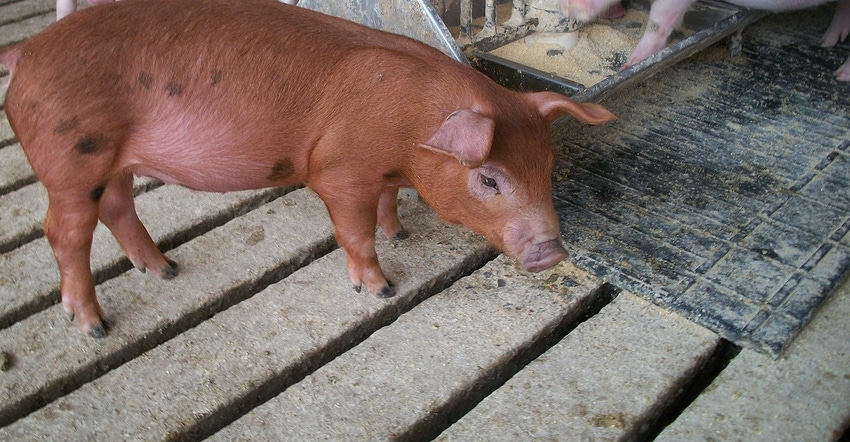
With African swine fever spreading in China, as well as Belgium, Romania and other European countries, the U.S. swine industry is on high alert.
Back in September, USDA and FDA officials met various pork groups, including the American Association of Swine Veterinarians, the National Pork Board, the National Pork Producers Council and the Swine Health Information Center, to review measures to prevent the spread of ASF in the U.S. Those in attendance also discussed diagnostic preparedness, surveillance and responses to the infection.
The University of Minnesota Veterinary Diagnostic Laboratory is an ASF-approved testing facility. The lab can test whole blood and tonsil tissue samples submitted by a foreign animal disease diagnostician.
According to information provided by the U-M College of Veterinary Medicine, ASF is a highly contagious disease of swine, including domestic hogs, warthogs, European wild boar and American wild pigs. It produces a range of clinical signs and lesions. As a hemorrhagic disease, it closely resembles classical swine fever.
The disease has a short incubation period of three to seven days, followed by a high fever and death in five to 10 days. Forms of ASF also include a chronic manifestation, which is characterized by emaciation, swollen joints and sometimes respiratory problems.
Pigs become infected by direct contact with infected pigs or by ingestion of unprocessed, infected pig meat or products. Biting flies, ticks, contaminated farms and fomites can also spread the virus.
The virus is highly resistant to a wide pH range, and to freezing and thawing.
There is no treatment for ASF and no vaccine.
Successful eradication involves rapid diagnosis, slaughter and disposal of all animals on an infected farm.
Additional information is available on the U-M College of Veterinary Medicine’s webpage, z.umn.edu/africanswinefever.
More on African swine fever
The Swine Health Information Center also provides information on ASF. Here is an edited version of an online question-and-answer article on the topic:
What is the status of U.S. testing of imported feed and feed additives? USDA and FDA believe a variety of data gaps and other unknowns make it impossible to accurately define or validate feed risk. Without the ability to accurately determine the potential risk associated with feed, the design and implementation of a feed testing strategy is not currently feasible. To mitigate feed risk, U.S. pork groups are working directly with the feed industry to develop programs to address feed safety.
What is the status of meat imports from countries that are ASF-positive? The USDA’s Animal Plant and Health Inspection Service import restrictions prohibit the entry of untreated animal products, including meat and meat products, from countries with certain diseases. Fresh and frozen pork are prohibited from regions affected with foot-and-mouth disease, classical swine fever, swine vesicular disease and African swine fever, while meat that has been cooked to standards at least equivalent to those set by the USDA Food Safety Inspection Service is allowed under APHIS regulations.
What precautions are being taken specific to ASF outbreaks in Europe? European outbreaks are investigated and managed by the individual country’s veterinary authorities. Affected regions are cordoned off from swine movement and pork trade with unaffected regions. The European Union is transparent in its review and zoning of the current ASF situation, and APHIS is in regular contact with the EU about current zoning status.
How is the Swine Health Protection Act being enforced to guard against spread through waste feeding? Authority to ban the feeding of plate waste containing meat is under the regulatory authority of the states, not with the USDA. USDA has committed to evaluating the need to improve inspection of swine feeding sites licensed to feed plate-food waste, and enforcement on sites doing so that are unlicensed.
What about international garbage that come in on ships and planes? APHIS has had controls in place for decades on international garbage, including food waste from ships, airlines and international conveyances. These controls require all international garbage to be disposed of appropriately and under APHIS supervision. Internationally transported garbage must be moved under seal to approved incineration facilities.
How is communication being handled around this situation? USDA has biweekly calls for U.S. pork industry stakeholders to provide updates and discuss ASF-related issues.
Additional sources of information on ASF include:
* USDA APHIS swine disease information
* American Association of Swine Veterinarians, foreign animal disease webpage
* National Pork Board, pork.org/fad
* Swine Health Information Center, global disease surveillance reports and domestic disease surveillance reports
According to USDA, ASF has never been reported in the United States, Canada, Australia or New Zealand.
About the Author(s)
You May Also Like






